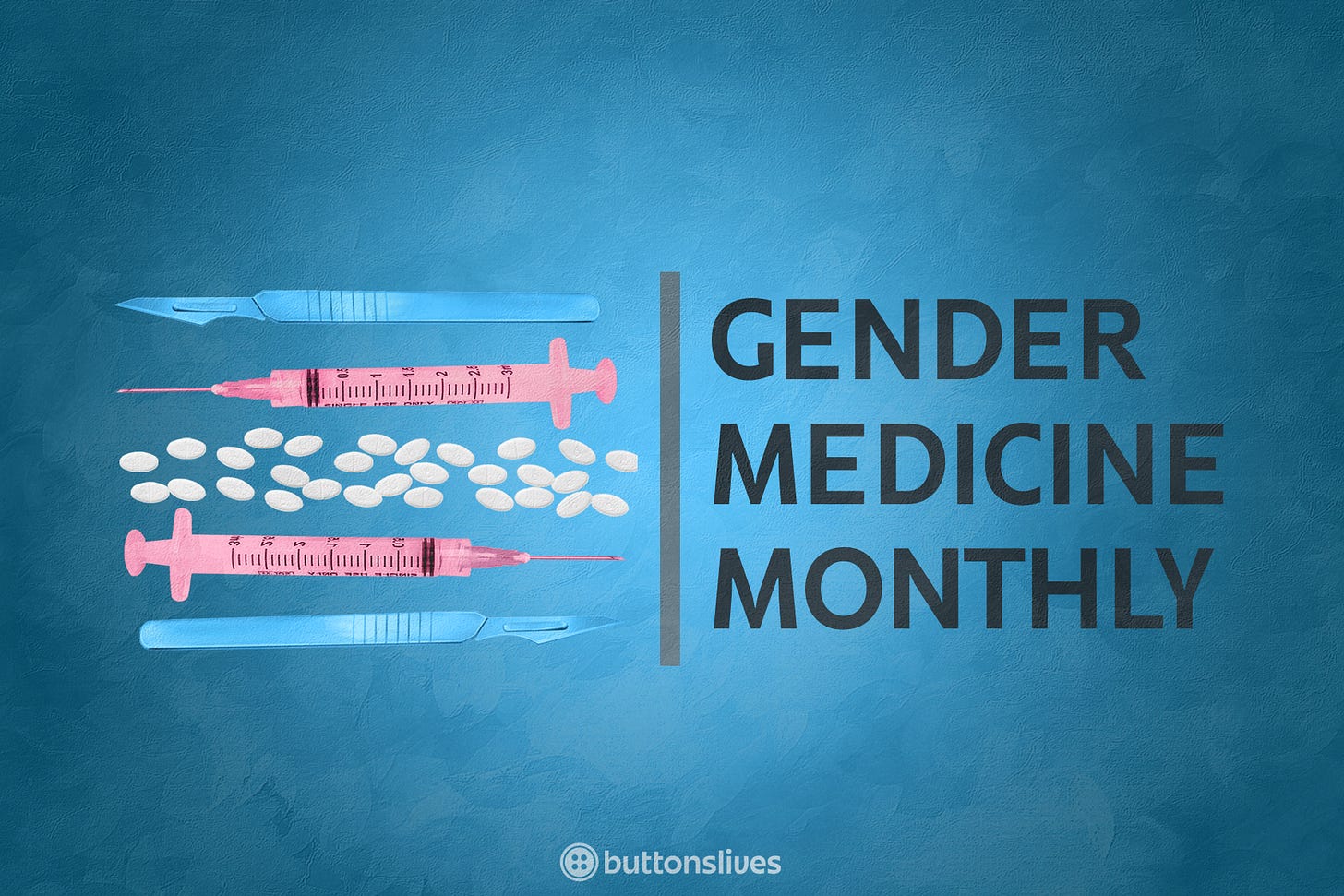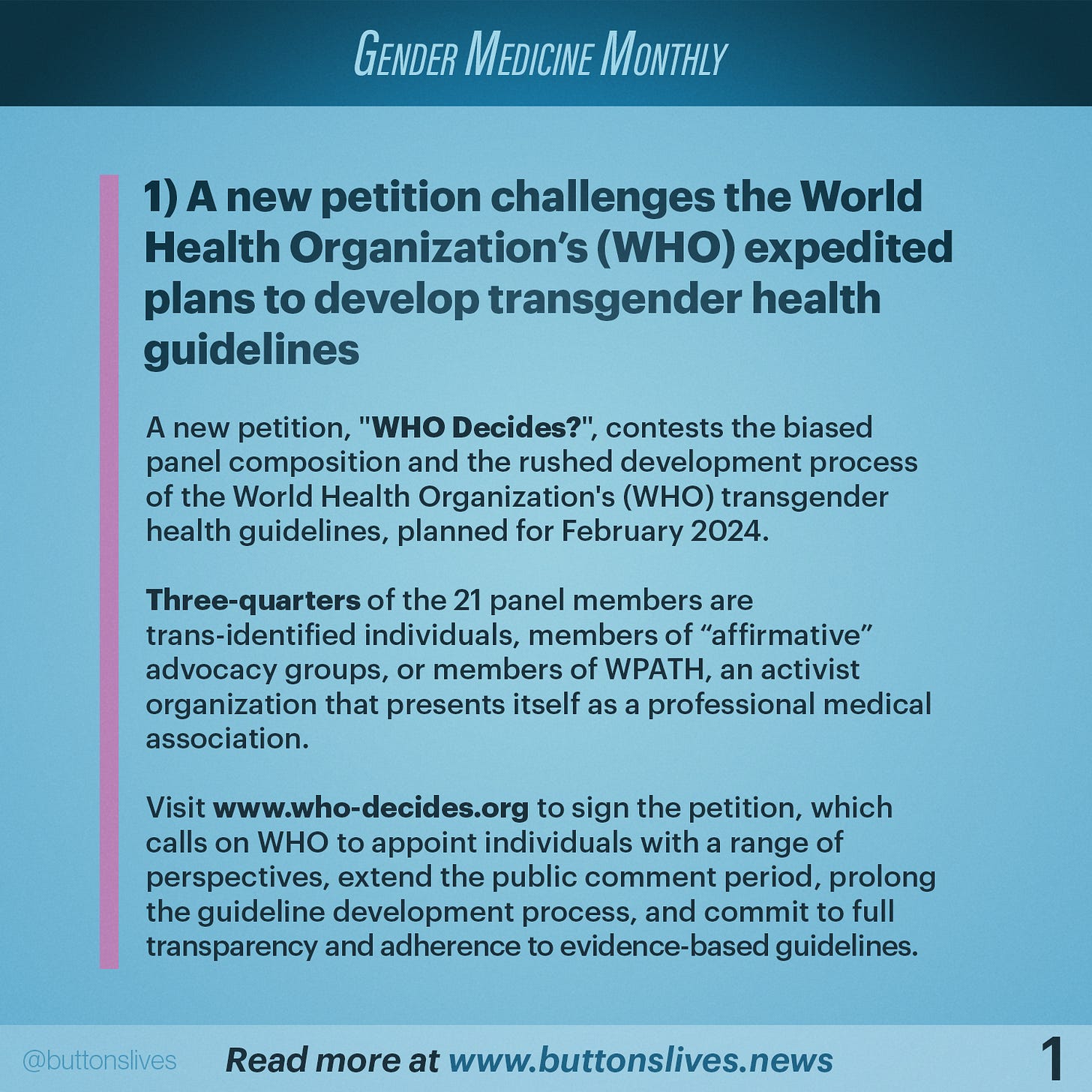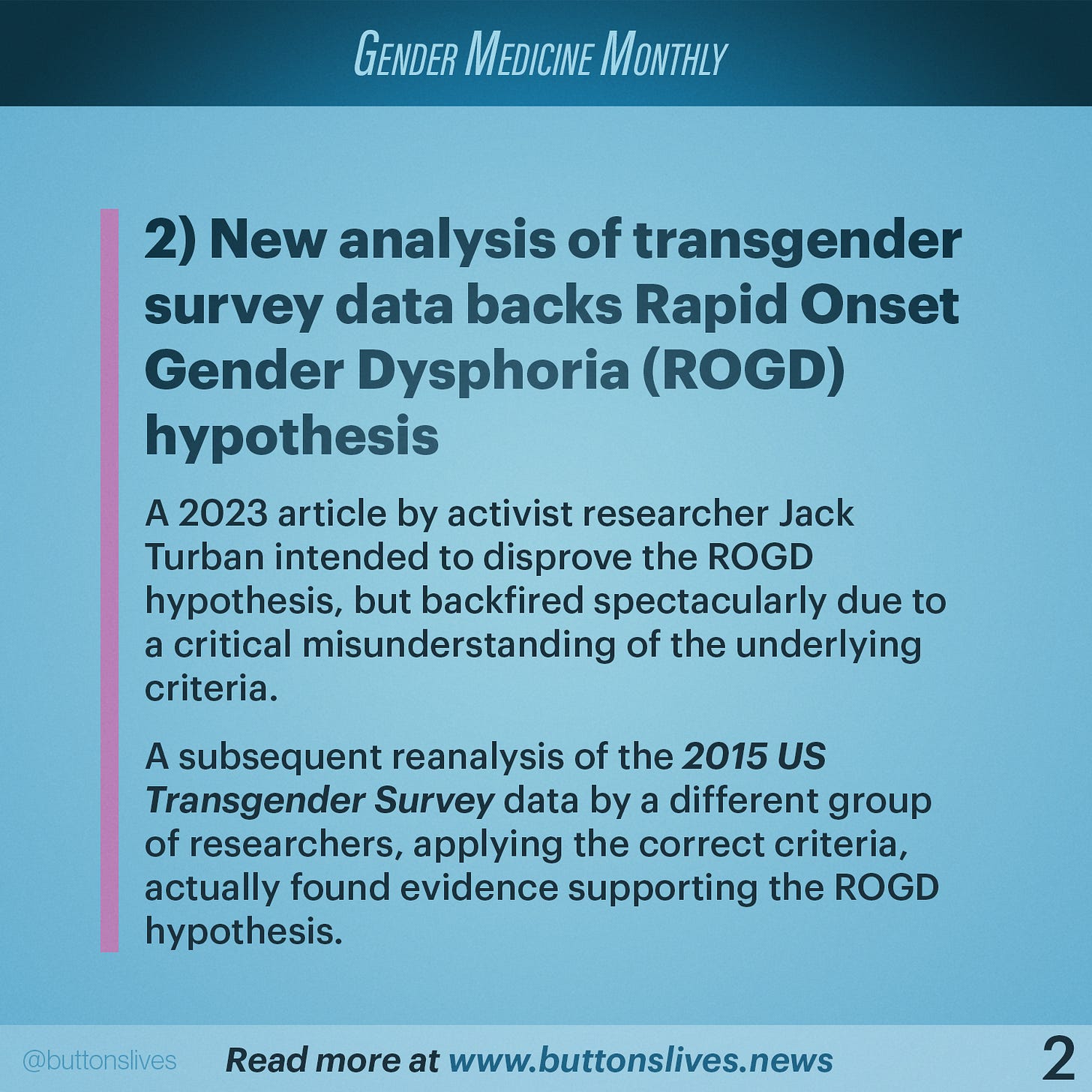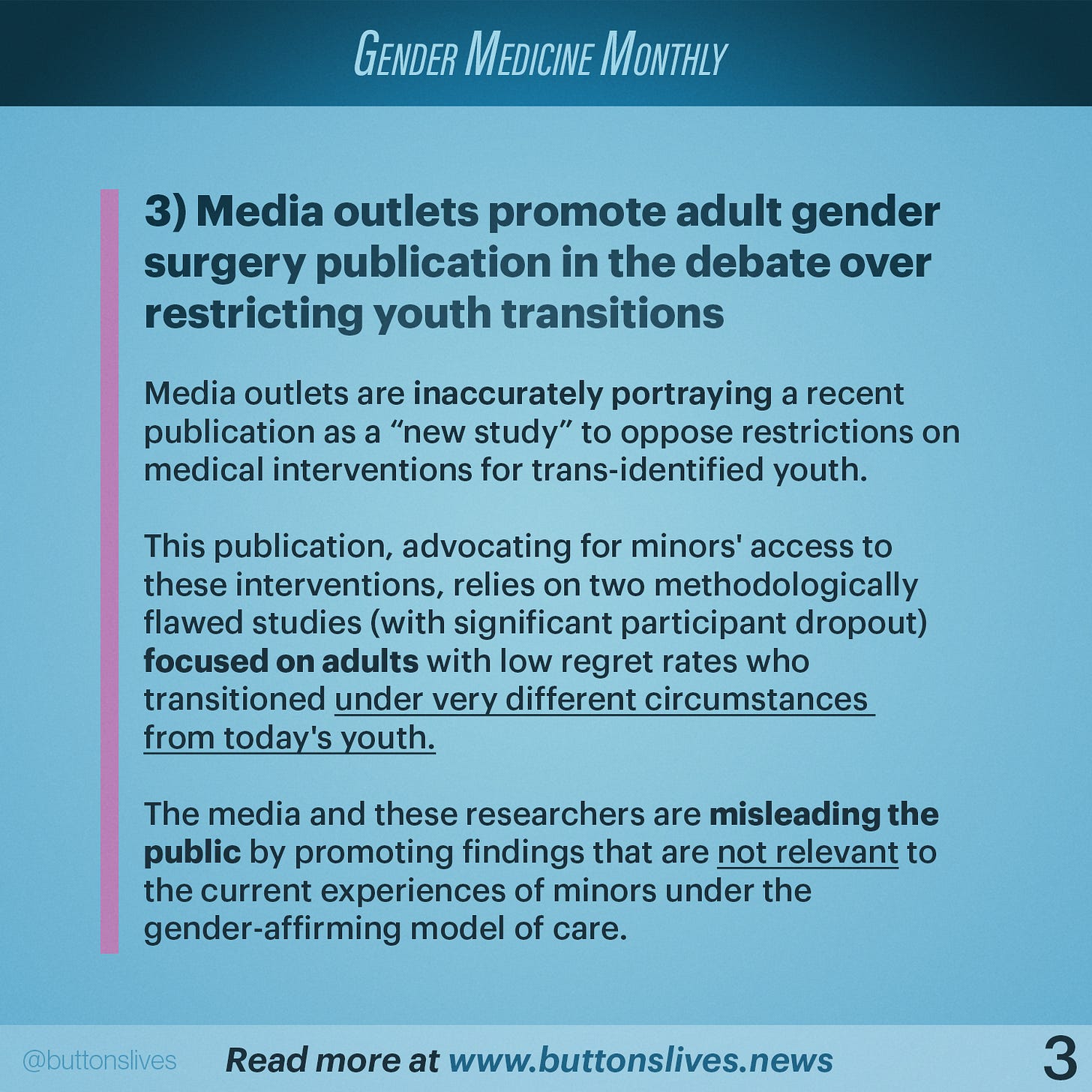Gender Medicine Monthly
2023 | November - December
This is the 9th edition of my newsletter Gender Medicine Monthly, dedicated to the latest updates, international news, new research, and debunking of pseudoscience related to gender medicine and detransition — for paying subscribers.
March’s inaugural issue is free, as well as a preview of the first part of each issue. If you find the content of this newsletter valuable, please consider becoming a paid subscriber. Your support helps me dedicate my time and energy to producing quality content.
Here are some important headlines in gender medicine from November to December 2023 covered in this edition of Gender Medicine Monthly.
A new petition challenges the World Health Organization’s (WHO) expedited plans to develop transgender health guidelines
New analysis of transgender survey data backs ROGD hypothesis
Media outlets promote adult gender surgery publication in the debate over restricting youth transitions
Three new publications on detransitioners
A new scientific report in Germany sparks debate about youth gender transition
SPLC releases sloppy hit piece on groups advocating for evidence-based approach to gender medicine
New psychiatry publication likens gender transition to teen rebellion
New study on detransition launches, poised to be the largest to date
1. A new petition challenges the World Health Organization’s (WHO) expedited plans to develop transgender health guidelines
Source: SEGM 12/26/23 WHO-decides.org 12/30/23
A new petition, "WHO Decides?", launched on December 30th, contests the biased panel composition and rushed development process of the World Health Organization's (WHO) transgender health guidelines, planned for February 2024.
The WHO announced on December 18, 2023, the formation of the Guideline Development Group (GDG), tasked with writing the guidelines. The Society for Evidence-based Gender Medicine (SEGM) and the WHO Decides? petition have highlighted conflicts of interest within the GDG.
As Manhattan Institute fellow Leor Sapir points out: three-quarters of the 21 panel members are trans-identified individuals, members of “affirmative” advocacy groups, or members of WPATH, an activist organization that presents itself as a professional medical association. The petition argues that this composition violates WHO’s conflict of interest policies and could lead to biased recommendations.
Additionally, there are concerns about the brief three-week public comment period that ends on January 8, 2024, occurring over a holiday period, which is unusually short for such a guideline development process. The rapid and "unprecedented" pace of the guidelines' development, with the GDG meeting scheduled for February 2024, has also raised red flags.
The petition calls on WHO to appoint individuals with a range of perspectives, extend the public comment period, prolong the guideline development process, and commit to full transparency and adherence to evidence-based guidelines.
Significance: For obvious reasons, we don’t need yet another unscientific, ideologically-driven set of guidelines on trans healthcare, which might contribute to the false perception of “scientific consensus” among US-based medical organizations’ endorsements of the gender-affirming model of care. (See Leor Sapir’s primer on the misinterpretation of science by these organizations.)
But also, as SEGM points out, while the nations that have demonstrated a commitment to evidence-based medicine in youth gender medicine (England, Sweden, Finland, etc.) may disregard biased WHO guidelines, countries with fewer resources or those new to the international debate might struggle with guidelines that seem evidence-based but could endorse non-beneficial or harmful practices for gender-dysphoric youth.
People are encouraged to submit public comments by January 8, 2024 to the email provided by WHO: hiv-aids@who.int
The petition is available for anyone to electronically sign, but signatures from medical and mental health professionals are especially needed.
2. New analysis of large scale transgender survey data finds support for ROGD hypothesis
Source: Archives of Sexual Behavior 12/18/23
In a recent Letter to the Editor in Archives of Sexual Behavior, Manhattan Institute fellow Leor Sapir, public health researcher Dr. Lisa Littman, and Professor Michael Biggs critique a recent article by Jack Turban and colleagues. Turban's article, which used data from the 2015 US Transgender Survey, aimed to disprove the Rapid Onset Gender Dysphoria (ROGD) hypothesis.
Sapir and colleagues argue that the 2015 US Transgender Survey data actually supports, rather than refutes, the ROGD hypothesis, contrary to what Turban's paper suggested. They point out a key limitation in Turban’s analysis: it focuses on adults who currently identify as transgender, thus excluding those who may have experienced a sudden and transient identification as transgender during adolescence.
Sapir and his co-authors assert that to accurately assess the ROGD phenomenon, the analysis should have concentrated on respondents aged 18 to 24. This demographic is crucial because they were adolescents during the period when trans-identification rapidly expanded, especially among young girls. Analyzing this age group in the 2015 survey, Sapir and his colleagues found that the majority had a "late realization" of “being trans,” typically at age 11 or older, with a median of 3 years passing before they disclosed their transgender identity. This finding, they argue, is consistent with the ROGD hypothesis.
Significance: Dr. Jack Turban is an assistant professor of child and adolescent psychiatry at the UCSF and is known for his activism promoting youth gender transition and for producing deeply flawed research. His latest attempt to debunk the ROGD hypothesis backfired spectacularly due to his failure to properly understand the criteria in Lisa Littman’s original paper on ROGD.
In contrast to Turban's bad faith approach, Sapir and Littman actively engage with the discourse and have addressed five points raised by critics in a new article on Reality’s Last Stand, illustrating their commitment to transparency and rigorous debate.
3. Media outlets promote adult gender surgery publication in the debate over restricting youth transitions
Source: JAMA Surgery 12/27/23
A new publication that claims to find a low rate of regret for gender-affirming surgeries is being used to argue against restricting youth medical transition. Some outlets have referred to the publication as a “new study.” In reality, it's just a letter reiterating two earlier studies with minimal relevance to youth under the new gender-affirming model of care.
The lead author is social scientist Harry Barbee (“they/them”), whose profile on the John Hopkins website says his research concerns “the emotional burdens of living in a society that assumes a gender binary.” The co-authors are plastic surgeons at the Center for Transgender and Gender Expansive Health at John Hopkins.
Barbee et al. appears to be influenced by political agendas, evident from their references to legislative endeavors concerning minor surgeries. They cherry-picked two studies that found a low rate of regret and use them to argue for “policymakers to abandon policy initiatives that deny TGD people access to GAC…”
Studies that find low rates of regret are primarily derived from adults who transitioned under very different circumstances from today's youth. They have considerable methodological flaws and a substantial loss to follow-up. Researchers have already thoroughly debunked the two studies cited, Bustos et al. and Bruce et al., and highlighted why they are not applicable to today’s youth.
Missing from the Barbee et al. letter is consideration of studies actually relevant to the younger cohort that find 29-30% of minors change their minds with regards to "gender-affirming" medical interventions after several years.
Significance: Of course, media outlets have already picked up the Barbee et al. article and have begun generating new headlines touting it as more evidence against restricting medical interventions for minors.
The fact that the authors of this article refer to gender-affirming care as "evidence-based" is comical. US-based medical organizations have repeatedly refused calls to align their guidelines with the best available evidence.
The European countries that have aligned their guidelines with systematic evidence reviews, which are the gold standard of evidence-based medicine (EBM), have heavily restricted youth medical transition.








